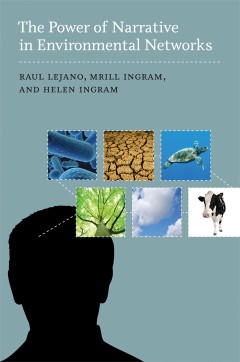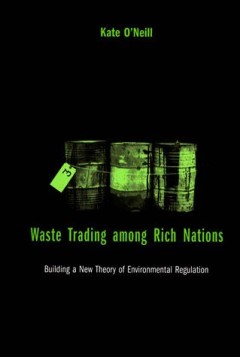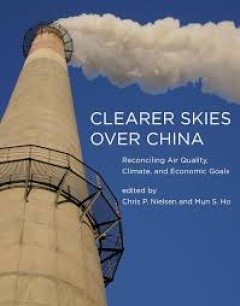Filter by

The Power of Narrative in Environmental Networks
For as long has humans have lived in communities, storytelling has bound people to each other and to their environments. In recent times, scholars have noted how social networks arise around issues of resource and ecological management. This book argues that stories, or narratives, play a key role in these networks - that environmental communities 'narrate themselves into existence'. The book p…
- Edition
- -
- ISBN/ISSN
- 9781461937128
- Collation
- 1 online resource (xiv, 225 pages) :illustrations, map.
- Series Title
- -
- Call Number
- -

Waste Trading among Rich Nations: Building a New Theory of Environmental Regu…
When most people think of hazardous waste trading, they think of egregious dumping by U.S. and European firms on poor countries in Africa, Latin America, and the Caribbean. But over 80 percent of the waste trade takes place between industrialized nations and is legal by domestic and international standards. In Waste Trading among Rich Nations, Kate O'Neill asks why some industrialized nations v…
- Edition
- -
- ISBN/ISSN
- 9780262280891
- Collation
- 1 online resource (xix, 298 pages).
- Series Title
- -
- Call Number
- -

New Romantic Cyborgs: Romanticism, Information Technology, and the End of the…
A detailed examination of the UN's Sustainable Development Goals and the shift in governance strategy they represent.OCLC-licensed vendor bibliographic record.
- Edition
- -
- ISBN/ISSN
- 9780262337410
- Collation
- 1 online resource (xv, 333 pages).
- Series Title
- -
- Call Number
- -

Clearer skies over China: reconciling air quality, climate, and economic goals
China's carbon dioxide emissions now outstrip those of other countries and its domestic air quality is severely degraded, especially in urban areas. Its sheer size and its growing, fossil-fuel-powered economy mean that China's economic and environmental policy choices will have an outsized effect on the global environmental future. This book offers an integrated analysis of China's economy, emi…
- Edition
- -
- ISBN/ISSN
- 0262315416
- Collation
- 1 online resource.
- Series Title
- -
- Call Number
- -

The green power of socialism :wood, forest, and the making of Soviet industri…
"An environmental history of the Soviet forestry industry, showing how a utilitarian view of nature and the "rational" use of natural resources plays out in practice"--OCLC-licensed vendor bibliographic record.
- Edition
- -
- ISBN/ISSN
- 9780262377560
- Collation
- 1 online resource.
- Series Title
- -
- Call Number
- -

Mussolini's nature :an environmental history of Italian Fascism
"Explores how Mussolini's regime developed a political ecology that mobilized nature to legitimize and serve fascist interests"--OCLC-licensed vendor bibliographic record.
- Edition
- -
- ISBN/ISSN
- 9780262372398
- Collation
- 1 online resource
- Series Title
- -
- Call Number
- -

Monsoon economies :India's history in a changing climate
How interventions to mitigate climate-caused poverty and inequality in India came at a cost to environmental sustainability.In the monsoon regions of South Asia, the rainy season sustains life but brings with it the threat of floods, followed by a long stretch of the year when little gainful work is possible and the threat of famine looms. Beginning in the late nineteenth century, a series of i…
- Edition
- -
- ISBN/ISSN
- 9780262369275
- Collation
- 1 online resource (xiii, 212 pages)illustrations
- Series Title
- -
- Call Number
- -

Resigned activism :living with pollution in rural China
"An examination of the daily grind of living with pollution in rural China and of the varying forms of activism that develop in response, revised from the original 2017 edition with a new preface"--OCLC-licensed vendor bibliographic record.
- Edition
- Revised edition.
- ISBN/ISSN
- 9780262365321
- Collation
- 1 online resource.
- Series Title
- -
- Call Number
- -

They knew :the US federal government's fifty-year role in causing the climate…
"In 2015, a group of 21 young people came together to sue the federal government for violating their constitutional rights by promoting the climate catastrophe that has already begun to deprive them of life, liberty and property without due process of law. The path breaking litigation, Juliana v United States, has had more success in the courts than many expected, but the federal government has…
- Edition
- -
- ISBN/ISSN
- 0262366800
- Collation
- 1 online resource.
- Series Title
- -
- Call Number
- -

The politics of rights of nature :strategies for building a more sustainable …
"On the global development of legislation, treaty negotiations, constitutional measures, and litigation resulting in legal recognition of Rights of Nature (RoN), including the cultural and political influences that determined how these legal rights were framed, the method of adoption and, importantly, the evolution of RoN enforcement through judicial decisions and growing cultural familiarity w…
- Edition
- -
- ISBN/ISSN
- 0262366606
- Collation
- 1 online resource.
- Series Title
- -
- Call Number
- -
 Computer Science, Information & General Works
Computer Science, Information & General Works  Philosophy & Psychology
Philosophy & Psychology  Religion
Religion  Social Sciences
Social Sciences  Language
Language  Pure Science
Pure Science  Applied Sciences
Applied Sciences  Art & Recreation
Art & Recreation  Literature
Literature  History & Geography
History & Geography